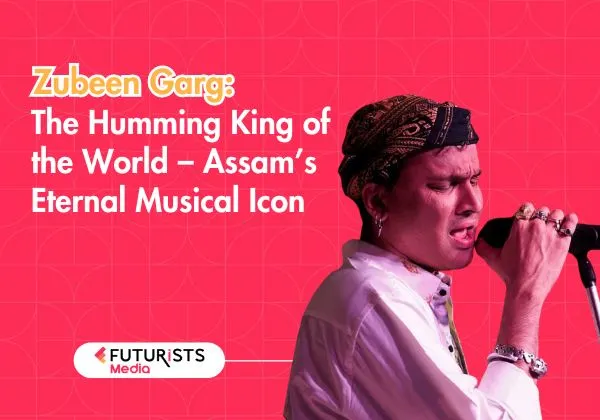Assam mourns the untimely loss of Zubeen Garg, the “Humming King of the World.” Explore his journey through Zubeen Garg songs, his Zubeen Garg total songs, his Zubeen Garg world record, and his historic farewell — the 2nd largest artist funeral after Michael Jackson.
The crisp fragrance of autumn faded too soon in September 2025, as Assam’s skies turned heavy with grief. On September 19, 2025, the state lost its most beloved son, and India lost one of its most extraordinary cultural figures- Zubeen Garg. Known as the “Humming King of the World,” Zubeen was more than a singer; he was an entire movement, a phenomenon who gave voice to generations and carried Assamese music onto the global stage.
On September 21, 2025, Guwahati stood still. Traffic halted, businesses shut down, and everyday life paused as lakhs of grieving fans flooded the streets to bid farewell to their icon. The city transformed into a river of emotion, where tears, songs, flowers, candles, and prayers flowed together in an overwhelming tribute to a man who had defined their cultural heartbeat.
A Historic Farewell That Shook the World
The farewell of Zubeen Garg has been officially recognized by the Limca Book of Records as the fourth-largest public funeral gathering in the world. Such was the love for him that Assam’s farewell now stands in the same global league as the historic goodbyes of Michael Jackson, Princess Diana, Pope Francis, and Queen Elizabeth II.
But for many of his fans, statistics do not capture the true scale of devotion. In reality, Zubeen Garg became the 2nd artist after Michael Jackson to draw such a massive sea of people, a wave of humanity that showed the unbreakable bond he shared with his admirers. Every corner of Guwahati echoed with his songs, with fans humming softly through their tears, a final chorus for the man they called “Luit Kontho” (Voice of the Brahmaputra).
The record immortalizes him not just as a singer, composer, actor, and filmmaker, but as a superstar of the people, whose impact transcended borders and whose art belonged to millions.
Early Life and Family
Zubeen Garg (born Jibon Borthakur; 18 November 1972 – 19 September 2025) was born into an Assamese Brahmin family in Tura, Meghalaya. His father, Mohini Mohon Borthakur, was a Magistrate, lyricist, and poet who wrote under the pen name Kapil Thakur, while his mother, Ily Borthakur, was a singer who nurtured his love for music.
Originally named Jibon, his first name was later changed in homage to the legendary conductor Zubin Mehta. The surname “Garg,” chosen from his Brahmin gotra, gave him a unique identity that balanced global inspiration with Assamese tradition.
The family hailed from Tamulichiga (Jhanji), Jorhat, Assam. Tragedy struck when his sister, Jonkie Borthakur, a singer and actress, died in a road accident in 2002. To honor her memory, Zubeen released the emotional album Xixhu. His younger sister, Palme Borthakur, later became a professor of geography.
The Making of a Legend
A true prodigy, Zubeen was a multi-instrumentalist who mastered 12 instruments including anandalahari, dhol, dotara, guitar, harmonium, tabla, mandolin, harmonica, and drums. He trained in Assamese classical traditions like Borgeet and Ojapali, while also embracing folk forms such as Bihu, Goalparia, and Tokari.
In 1992, he released his Assamese debut album Anamika, which skyrocketed him to fame. National recognition came with the Bollywood blockbuster track “Ya Ali” from Gangster (2006), cementing his status as a pan-Indian star.
Over time, his discography expanded into the thousands. Zubeen Garg total songs crossed an astounding 38,000 recordings, making him one of the most prolific singers in history. His music cut across languages, with Zubeen Garg songs in more than 40 tongues including Assamese, Hindi, Bengali, Tamil, Telugu, Nepali, Malayalam, Bhojpuri, and English.
Zubeen Garg World Record: A Musical Machine
His sheer output was superhuman. At his peak, Zubeen once recorded 36 songs in a single night — a feat that earned him a place in the Limca Book of Records and established him as an unstoppable force of music.
Yet, behind the glory lay a personal struggle. In his last podcast with author Rita Choudhury, Zubeen admitted:
“Muk jontro bonai disile… I am not a machine. People turned me into a machine, I wasn’t like that.”
With raw vulnerability, he revealed the toll of his career, saying:
“In a war, when a fighter dies, only 3–4 people close to him remain, the rest run away. I will see who looks after me when I get old.”
These words, spoken just before his untimely passing, now haunt millions who wish he had been given more rest, more care, and more peace.
Beyond Music: A Cultural Powerhouse
Zubeen was never confined to singing. He was a composer, actor, director, filmmaker, poet, and philanthropist. His films and albums shaped Assamese identity, while his philanthropy touched countless lives.
He worked for flood relief, education, healthcare, and mentored upcoming artists.
In every way, he was Assam’s cultural ambassador to the world.
A Tragic End
On September 19, 2025, while attending a cruise party in Singapore, Zubeen tragically drowned during a swim in the sea. News of his death spread like wildfire, leaving an entire state and millions beyond its borders in disbelief and sorrow.
Two days later, on September 21, Guwahati transformed into a city of mourning. His mortal remains, draped in the traditional Assamese gamusa, were carried through packed streets as lakhs followed him for one last journey. Loudspeakers echoed with Zubeen Garg songs, and fans hummed softly in unison, a final offering of love.
Assam Pauses as Lakhs Gather to Say Goodbye
The farewell was not just a funeral — it was a people’s movement. Roads choked with mourners, skies filled with prayers, and the Brahmaputra city wrapped itself in grief.
“It is not just the end of an artiste’s journey but the passing of an era of Assamese music,” said one grieving fan in tears.
This unparalleled gathering marked Zubeen Garg’s funeral as the 2nd largest for an artist after Michael Jackson, placing him among the most celebrated global figures.
The Voice That United Generations
For over three decades, Zubeen was the heartbeat of Assam. His music bridged rural villages and bustling cities, old traditions and new generations, Assamese roots and global sensibilities.
Even in death, his legacy stands immortal:
- Zubeen Garg total songs: 38,000+ across 40 languages.
- Zubeen Garg world record: 36 songs recorded in a single day.
- Recognition by Limca Book of Records for both his recordings and his funeral.
- Known forever as the Humming King of the World.
The Funeral That Made History
The scale of the funeral stunned observers worldwide. Never before had Assam witnessed such unity in mourning. The sheer number of people, the depth of sorrow, and the emotional tributes made it one of the largest public funerals ever recorded.
By being recognized in the Limca Book of Records, Zubeen’s farewell is now officially ranked as the fourth-largest funeral gathering in the world. But more emotionally powerful is the fact that Zubeen Garg is now remembered as the only artist after Michael Jackson to draw such an ocean of humanity at his death.
What made the farewell even more poignant was the fulfillment of Zubeen’s own wish. In one of his heartfelt moments, he had once said that when he died, a single song should echo across Assam — “Mayabini Ratir Bukut.” This timeless masterpiece of his became the anthem of his final journey.
From the moment news of his passing spread until his cremation, people across Assam sang the song in unison. Loudspeakers in Guwahati carried its haunting melody, while fans, young and old, hummed and wept through its verses, making it a collective chorus of farewell.
This was not merely a statistic; it was a reflection of how deeply he belonged to the people, and how his music became the very language of grief and love in his final goodbye.
A Legacy That Lives On
Zubeen Garg was not just a performer; he was a movement. He used his voice to champion Assamese culture, fought for social causes, and inspired generations of musicians. From Ya Ali in Bollywood to evergreen Assamese classics like Mayabini, his songs transcended boundaries of language and geography.
Even in death, Zubeen has left behind more than melodies. He has left a blueprint of passion, rebellion, and authenticity. His music will continue to be sung in fields, homes, festivals, and stages for centuries to come.
Final Thoughts: Zubeen Lives Forever
As Assam mourns, it also celebrates the gift of Zubeen Garg. His life was proof that one man with music in his soul could move millions. His funeral may have been his final performance, but it was also his grandest—uniting lakhs in a chorus of love, grief, and gratitude.
For the world, he is now a part of history alongside Michael Jackson, Pope Francis, Queen Elizabeth II, and Princess Diana. For Assam, he is eternal.
Zubeen Garg may have left this world, but his voice will forever echo—across rivers, hills, cities, and hearts.







